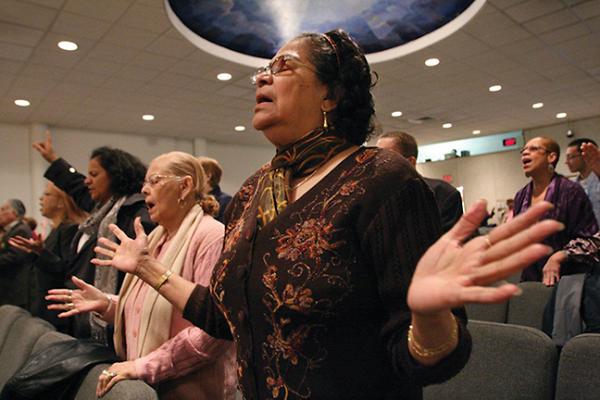DURING ONE OF my first visits to a church in San Antonio for the Latino Protestant Congregations Project, the pastor invited a church member to speak about his experience in a federal immigration detention center. An elderly gentleman rose from his seat with a Bible tucked under his arm. For the next hour, this man, a Salvadoran undocumented immigrant, told his story.
He had been handed over to immigration officials after a minor traffic violation and was transferred to one of the largest detainment centers in south Texas. Without being overtly political, he stated matter-of-factly the conditions he endured at the overpopulated detention center, including the loud crying by men in the cells next to him throughout the night. His case for amnesty looked grim. He prepared mentally for deportation to El Salvador, a place he had left to escape violence.
Then he remembered Peter’s imprisonment in Acts 12 and decided to start a Bible study for male detainees. He was given permission to preach twice a day. He said that 150 detainees attended his gatherings and 58 converted to the gospel. On hearing this, the congregation erupted in applause and cheers of “Hallelujah!”
This church had worked tirelessly to get him released. They raised money to pay court fees, hire an attorney, and support his spouse. Endless phone calls were made to track down his records in El Salvador. Local leaders vouched for his character. The church’s efforts were eventually rewarded with his release. He—and they—understood his release as nothing short of a miracle. This Latino Protestant church provided him a platform to humanize his traumatic experience. While not intentionally political, his testimony carried political implications.
This is just one example of the many ways Latino Protestant congregations approach political and social engagement.
Beyond immigration, Latino Protestant congregations focus on a wide range of social issues. For example, in Oakland, Calif., churches advocate for affordable housing amid gentrification. In San Jose, congregations work to end gang violence. In San Antonio, they provide college scholarships and fresh produce in poor neighborhoods.
BY 2030, according to researchers, half of the Latinos in the U.S. will be Protestant. Latino Protestant churches are growing and parachurch organizations are expanding. This remarkable growth is not just about numbers, it’s about people, and so in 2013, my colleagues and I initiated a multiyear ethnographic study to gather qualitative data on Latino Protestantism.
The political and social actions taken on by the congregations we studied are shaped by their contexts. Often, congregations engage with issues they face daily, although some prefer not to label this advocacy work as “political.” Other Latino Protestant congregations completely avoid political hot topics. For example, a Southern Baptist congregation in Texas decided to drop the word “Hispanic” from its name because the term was deemed too political and racially divisive. This change was led by the pastor, who saw “political” issues as a distraction from the church’s mission.
We found that religious traditions and theological orientations played an important role in shaping the type of political and social engagement churches took up. They were not homogenous in their approach.
Faith-rooted social action will continue to be important in Latino Protestant congregations, particularly in a time of intensified immigration enforcement and continued socioeconomic inequality. Under the Trump administration, it’s likely that some Latino Protestants will gravitate toward stronger political stances and some will seek to eschew them altogether.

Got something to say about what you're reading? We value your feedback!







